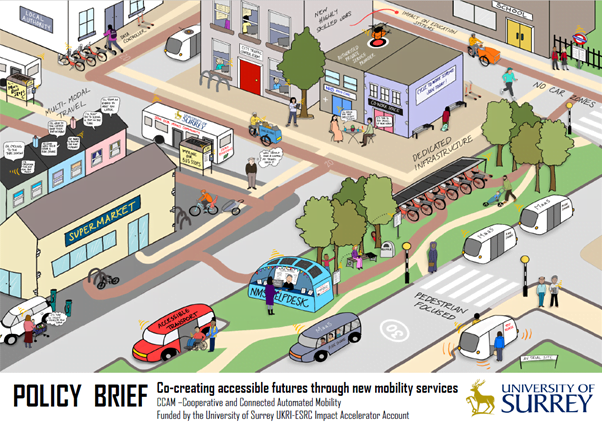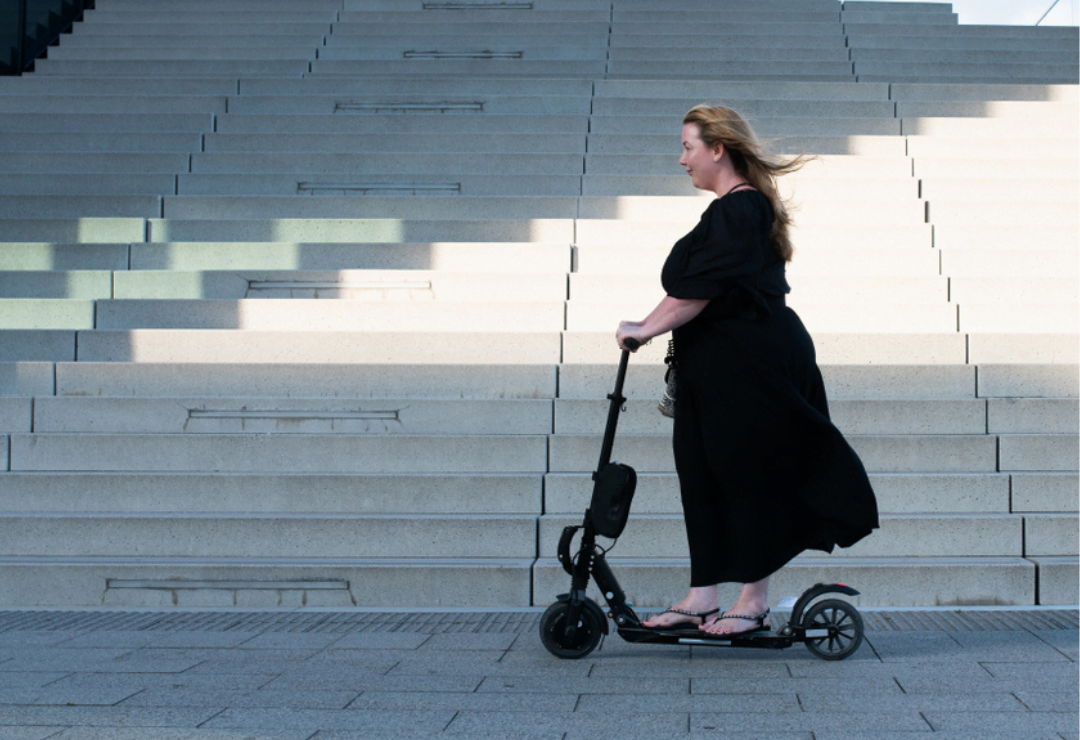Accessible Futures
New mobility services (NMS) mean so many different things to so many different people. How can we merge research outputs with user views to ensure that everyone is on board? Basically, how can we co-create accessible and inclusive NMS?
All digital technology-based mobility services tested and deployed today, from shared taxi rides and shared bicycle schemes to electric and autonomous vehicles, are considered new mobility services. Such new mobility services feature as a prominent solution globally to address climate change and the United Nations Sustainable Development Goals, given the high contribution of transport in greenhouse gas emissions as re-confirmed by the latest Intergovernmental Panel on Climate Change (IPCC) report. Extensive amounts of funding have been invested in new mobility technologies and regulations are slowly trying to catch up with the fast pace of relevant technological developments, including Artificial Intelligence (AI).
Yet, one missing link in all these developments has been the citizens’ view contributing to a user-centric approach. As highlighted in a Sustainability Special Issue, users have been largely sidelined regarding key decisions in designing new mobility services. Similarly to ongoing research, the WISE-ACT international survey — distributed in more than 20 countries within Europe and beyond, collected more than 4,000 responses stressing the existing differences between as well as within countries. A critical finding which led the authorities to reconsider their approach to new mobility services has been the relatively low acceptance level from the general public about automated and connected transport, particularly within certain types of localities.
Urban myths
Experience has demonstrated that policies which do not take citizen and user views into account can be hard to implement, costly to amend, and have negative social impacts: this is why, as part of policy development, it is essential to engage directly and meaningfully with citizens. The potential cost of low uptake of new mobility services would not be negligible for cities of any size, due to the high amounts of funding directed towards relevant projects since the last decade.

Co-creating new mobility services to include the needs of vulnerable road users. Credit: University of Surrey
For example, a high number of test sites have been funded throughout Europe and the UK Government has been funding four Future Transport Zones with £90 million since 2020. However, a number of myths surround new mobility services, including that climate change and sustainability challenges will be resolved automatically and that focusing on commuting will accelerate the adoption of new mobility services and will alleviate urban congestion. Making AI more accessible and visible is raising more questions at the moment, so what are effective ways to proceed?
The way ahead
The way ahead to ensure strong public support for accessible and inclusive NMS can only be founded upon co-creation with users based on Sustainable Urban Mobility Plans. This comprehensive approach recognises the vital role of citizens, considering that these advanced mobility solutions are technologically complex and challenge established social norms and practices for both users and businesses. In particular, a significant barrier to citizen inclusion in co-creation has been the limited visualisation during the early design stages — something that vehicle manufacturers are planning to address by developing demo-vehicles for use at conferences and exhibitions.

Policy brief on the co-creation of accessible NMS. Credit: University of Surrey
In the meantime, accessible videos, like the one shared by the Surrey New Mobility Service project, can bridge the gap by allowing vulnerable road users who are unable to attend large-scale events to participate in community discussions and visualise the impact of new mobility services on their travel experiences.
This is particularly important for marginalised socio-economic groups such as people with disabilities, older people, single parents and digitally marginalised people. By co-creating an approach with local experts and stakeholders, cities across the world have the opportunity to adjust large-scale survey findings to make them relevant to local communities and address local needs.
Focus groups held in Ljubljana and Surrey stressed the importance of ride-sharing services not excluding users with physical or mental disabilities, as also highlighted by the INDIMO project. Fair data management, including privacy concerns, has been found to be significant across e-scooters, Mobility as a Service (MaaS), and shared bicycles. Additionally, the general public seems not aware of the wider job implications of NMS — something that a project like WE-TRANSFORM can contribute to increasing awareness of. Lastly, infrastructure provision, and in particular curb and public space management (e.g. parking) have all been highlighted as vital factors influencing the uptake of new mobility services at the local level.
What is missing?
Advertisement of new mobility services and educating the public about their advantages and disadvantages.
Communication facilitates innovation
Knowledge is power, so an accessible Policy Brief is currently underway to support effective communication of local concerns. This will not only offer insights about new mobility services by local communities in Greece, Romania, Slovakia, Slovenia, and the UK, but it will also offer the opportunity to voice the interest and concerns of often underrepresented groups, which may otherwise be lost among the abyss of large international surveys and projects.

Credit: yurakrasil, Shutterstock
By bridging the gap between local communities, influential decision-makers in European capitals, and international organizations based in Brussels, and by centring and effectively visualising what citizens — all citizens — want and need, we may pave the way for improved communication, collaboration, and the flourishing of citizen science. That, in turn, might fuel public support for innovation and propels us towards a brighter future.
Click here to read the article in its original format.
About the author
Dr Nikolas Thomopoulos is an Associate Professor in Transport, Department of Tourism & Transport, School of Hospitality and Tourism Management, as well as the Living Lab Lead and a Fellow of the Institute for Sustainability at the University of Surrey. He was the WISE-ACT Chair and currently leads WP4 of WE-TRANSFORM.
